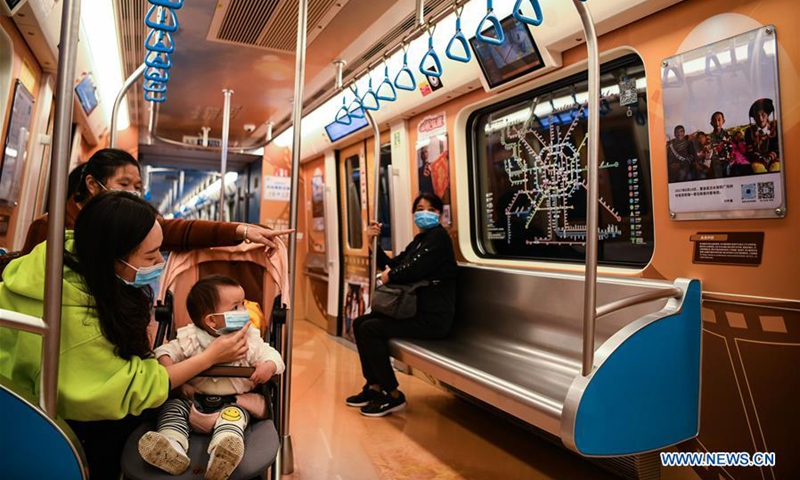Chengdu tightens COVID-19 control in communities, expands nucleic acid testing
Source: Global Times Published: 2020/12/9 13:32:43

Passengers take a poverty-alleviation-themed train of the Line 1 of Chengdu Metro in Chengdu, southwest China's Sichuan Province, Oct. 17, 2020.
After entering "wartime mode" amid a fresh COVID-19 outbreak, the southwest Chinese city of Chengdu has tightened epidemic control measures in residential compounds citywide and further expanded nucleic acid tests on Wednesday to cover some college students and faculty members.
According to local media Cover News, faculty members, students and their families from Chengdu University of Technology were asked to take nucleic acid tests from Wednesday.
Chengdu reported four new COVID-19 cases on Tuesday, one of whom was an employee at a canteen in a local school.
Secretary of the Communist Party of China Sichuan Committee Peng Qinghua announced that Chengdu had entered wartime mode on Tuesday.
Peng also emphasized that tracing the source of the virus, screening in key areas, and expanding the scope of nucleic acid testing in an orderly manner are the most important tasks in the next stage.
The local government will also continue to strengthen customs port management, strictly investigate sales of imported cold-chain food on e-commerce platforms and other channels, and strengthen prevention, control and inspection of cold-chain logistics and transport vehicles.
The local government has stipulated that all entrances into apartment complexes must be manned 24 hours a day, and anyone entering a community must present a health code and undergo temperature checks. All visitors must be registered before they enter a residential community.
The city is expanding nucleic acid testing and carrying out virus gene sequencing to curb the spread of COVID-19 and identify the source of the outbreak.
The first patient, a 69-year-old woman surnamed Lu who lives in the Pidu district, was diagnosed as having COVID-19 on Monday. She showed the onset of coronavirus symptoms such as cough the previous day. No information was released on how she contracted the virus.
She was upgraded from an ordinary patient to a severe case on Monday.
As for whether the sudden deterioration in the first patient's condition indicated the virus in Chengdu may have a stronger infectivity, health experts believed that in some patients the disease may progress rapidly and become severe very quickly, and this was not a special case, Health Times reported on Tuesday.
Senior experts in Sichuan Province pointed out Monday that positive samples from the patient's home were mainly from doorknobs, switches, some food in the fridge, and cutting boards. However, this does not necessarily indicate that the virus was stronger in infectivity.
As coronavirus can easily pollute the environment, anyone who came into the house with contaminated food, touched the food, and pushed the door open would leave traces of the virus on all these places. The sensitivity of nucleic acid testing is another reason, as it is able to detect even a tiny sample of the virus, experts said.
Posted in: SOCIETY,CORONAVIRUS